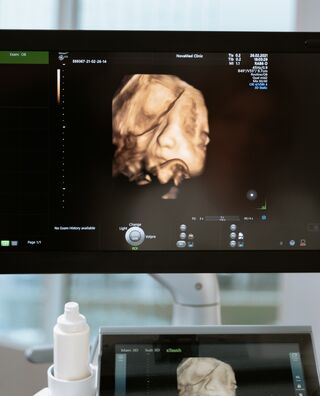- Fetuses between 32 and 36 weeks of gestation smile or frown in response to the food their mother is eating.
- This study is the first to prove that fetuses still in the womb react to different tastes and smells.
- A mother’s diet during pregnancy could have a long-term impact on a child’s food preferences.
Do you have a pregnancy craving for kale chips? Your baby might not thank you.
A study published in the latest issue of Psychological Science shows that fetuses between 32 and 36 weeks of gestation smile or frown in response to the food their mother is eating.

Based at Durham University’s Fetal and Neonatal Research Lab, the study’s research team used 4D ultrasound scans, which create three-dimensional videos of fetuses in utero, to see how the unborn children of 100 pregnant women reacted to food ingested by their mothers.
Each mother was given a capsule containing either carrot or kale powder 20 minutes before the ultrasound scan. Using pills instead of fresh carrot or kale controlled for the women’s own food preferences: the capsules had almost no smell or taste and only released their full flavor once they dissolved in the small intestine.
Fetuses exposed to the sweet taste of carrot responded with upturned lips and “laughter-face” expressions, while those exposed to the bitter taste of kale made “cry-face” expressions instead.
Senses and Facial Expressions Develop Throughout Pregnancy

Taste buds appear at eight weeks of gestation in human fetuses and can detect taste molecules in the amniotic fluid around 14 weeks. By 24 weeks, fetuses can smell odor-active molecules in the fluid through their newly opened nostrils.
Meanwhile, fetuses’ facial muscles are developing, and their facial expressions become more and more complex over the course of the pregnancy. From the second trimester, their expressions resemble the smiles and frowns they will make after birth.
Food Choices During Pregnancy Could Affect Baby’s Future Preferences
This study is the first to prove that fetuses still in the womb react to different tastes and smells.
Not only do these results give us a better understanding of the timeline for fetal sense development, but they also show that the mother’s diet during pregnancy is one way babies are introduced to new flavors, which could have a long-term impact on a child’s food preferences. A baby that tastes kale often enough in utero might be less likely to reject it when it’s fed to them after birth.

“We think that this repeated exposure to flavors before birth could help to establish food preferences post-birth, which could be important when thinking about messaging around healthy eating and the potential for avoiding ‘food-fussiness’ when weaning,” explains lead researcher Beyza Ustun, a postgraduate in Durham’s Fetal and Neonatal Research Lab.
Adds research co-author Jackie Blissett, a professor of psychology at Aston University, “Exposing the fetus to less ‘liked’ flavors, such as kale, might mean they get used to those flavors in utero.”
The research team has now begun a follow-up study with the same babies post-birth to see if they’re more accepting of carrot and kale flavors than their peers.
Whether or not the study saves the babies’ parents some food-related tantrums down the road, it offered a rare look into the world of late-term fetuses, says Ustun. “It was really amazing to see unborn babies’ reaction to kale or carrot flavors during the scans and share those moments with their parents.”
Source: Babies Can Taste Their Mothers’ Food in the Womb | Psychology Today Canada













